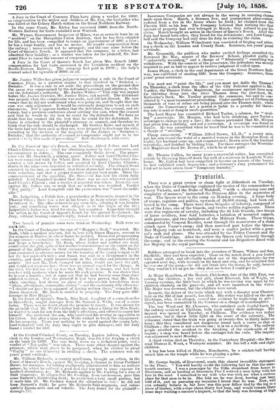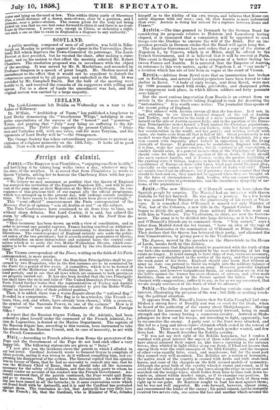Vroutunot.
There was a great review or sham fight at Aldershott on Tuesday, when the Duke of Cambridge explained the tactics of the commanders to Queen Victoria, and the Duke of Malakoff, "with a charming ease and simplicity of manner," instructed the Princess Alice in the mysteries of war. The Queen went to the camp on Monday evening. A large body of troops, regulars and militia, upwards of 20,000 strong, had been col- lected in the camp. There were three brigades of infantry, composed of six of the Line, one of the Guards, and twelve militia regiments. There were five regiments of cavalry, including the 2d Life Guards, two troops of horse artillery, four field batteries, a battalion of mounted sappers, with pontoons, and two battalions of the Military Train. These troops, commanded by General Knollys, went through the manoeuvres of a sham attack upon Caesar's camp ; and then marched past before the Queen. Her Majesty rode on horseback, and wore a scarlet jacket with a gene- ral's sash and plume. She was attended by the Prince Consort and the Duke of Cambridge. After the review the Queen rode leisurely through the camp ; and in the evening the General and his Brigadiers dined with her Majesty in the royal pavilion.
Robbers attempted to break into the premises of Messrs. Wilson and Son, Sheffield ; they had been expected ; those on the watch fired a gun loaded with small shot, and effectually marked one of the depredators—he was captured next day, with wounds on his hand and arm, and he admitted that he was one of the gang,—he did not break into the house, he said, because " they wouldn't let us get in—they shot me before I could get in."
As Major Hamilton, of the Hornet, Chichester, late of the 10th Foot, was rowing his children, a boy and girl, about Binstead, Isle of Right, on Tuesday evening, the little boat in which ho was rowing was upset by the children climbing on the gunwale, and all were immersed in the water. The Major was drowned, but the children were saved.
Bennett, the driver of the train which met with a disaster near Chester- field on the 23d of last month, has died. His stoker was killed on the spot, Blackham, who, it is alleged, caused the accident by neglecting to give a signal, has been committed by the Coroner on a charge of manslaughter.
The boy Wood and Mr. Channon, who sustained such fearful hurts by the railway accident at Chilham, both sunk under their sufferings. The inquest was opened on Tuesday, at Chilliiim. The evidence was rather extensive, but it threw little light on the cause of the calamity. The witnesses stated that the train was going at twenty-five to thirty miles an hour ; this they considered not dangerous round such a curve as that at Chilham ; the curve is not a severe one ; it is on a declivity. The railway people ascribed the accident to the breaking of the crank-axle of the engine ; a snap was heard before the carriages left the rails. The inquiry was adjourned to next Monday.
A third victim died on Thursday, in the Canterbury Hospital—the Reve- rend Thomas S. Wood, a Wesleyan minister. He has left a wife and eight children.
A boyihas been killed at Hulnie, Manchester, by a cricket-ball having struck him on the temple while he was playing a game.
Mr. George Smith, of Gravesend, sends this almost incredible statement to the Times. " You will hardly credit the following fact in this the nine- teenth century. I was a passenger by the Elfin steamboat from hence to Sheerness, and on landing at Sheerness Pier I noticed a man lying with his face in the mud. I remarked to my wife who was with me what a curious place for that man to be in. She told me he was dead, having just been told of it, and on pursuing my, inquiries I found that he was. Now, will you actually believe it, but here was tbis poor fellow tied by the leg to a piece of timber, with &rope about thirty feet long, and would remain there some days waitinga coroner's inquest, so that the body was floating at bight water and 1v. g on the mud at low. This within thirty yards of Sheerness a small &steno° of a. dozen men-of-war, close to a garrison, and I presume, near a police-station. The reason given for the body not being nicked up was that no one had come forward to claim it and there is no dead- house in Sheerness.I never !WV, except in China, so sickening a sight, and each a one as this to exist in Englandis a disgrace to any authority."



























 Previous page
Previous page